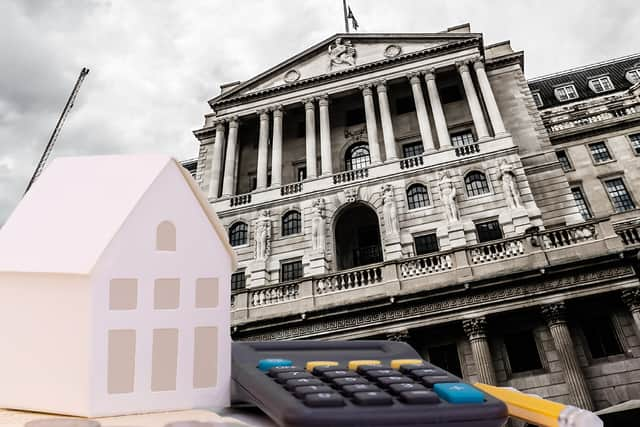Bank of England interest rates rise to 3.5% in new 14-year-high: what it means for mortgages and savings
and live on Freeview channel 276
The Bank of England has signalled it could continue to raise interest rates further in the coming months after hiking its base rate to a new 14-year-high.
The Monetary Policy Committee (MPC) on Thursday (15 December) chose to increase the rate from 3.% to 3.5%, despite inflation easing last month.
Advertisement
Hide AdAdvertisement
Hide AdThe rise was slightly less than the last rise in November when rates were increased by 0.75 percentage points and was the latest in a series of hikes since late last year when they were 0.1% as the Bank tries to get inflation under control.
But it marks the highest base rate since the financial crisis in 2008 when the rate was 4.5% in November that year. The Bank said rates needed to rise as the supply of workers remains tight, which is pushing up wages and in turn also pushes up inflation.
The MPC said a “forceful” policy response was justified as the labour market remained tight across the month and warned that more rises could come next year.
The Bank said on Thursday: “The majority of the committee judged that, should the economy evolve broadly in line with the November Monetary Policy Report projections, further increases in Bank rate might be required for a sustainable return of inflation to target.”


Advertisement
Hide AdAdvertisement
Hide AdOne of the Bank’s main responsibilities is to try to keep inflation at 2%, but it is currently more than five times that target. Increasing interest rates helps bring inflation back down as it makes borrowing money become more expensive and more profitable to save. It means there is less money being spent in the economy, so prices are likely to remain lower.
Martin Beck, chief economic adviser to the EY Item Club, said the minutes of the MPC meeting gave the impression that there are more increases to come, but he does not expect rates to hit more than 4% as inflation is likely to have passed its peak and a possible recession would ease pressures in the labour market.
“In these circumstances, the EY Item Club thinks the need to continue to significantly raise interest rates will soon fade and it is perfectly possible that another increase in the February meeting could be the last one for this cycle,” he said.
But what does the latest interest rate hike mean for mortgages and savings? Here’s a look at how it could impact your money.
What does the interest rate rise mean for mortgages?
Advertisement
Hide AdAdvertisement
Hide AdThe interest rate hike to 3.5% will most directly and immediately impact people with tracker mortgages as these correspond to what the Bank’s rate is.
The hike will add around £49 per month to the average tracker mortgage rate cost, according to calculations from trade association UK Finance, which amounts to more than £500 extra per year.
Simon Gammon, managing partner at Knight Frank Finance, said: “The cost of tracker products will continue to rise and (is) rapidly approaching parity with fixed-rate products. The best trackers will be in the region of 4%, while the best five-year fixed products are around 4.6%.”
Around four-fifths homeowners have fixed mortgage rates so these people will not be immediately affected, but borrowers on these deals are being warned to expect a rise when their fixed-rate comes to an end.
Advertisement
Hide AdAdvertisement
Hide AdMoney Saving Expert founder Martin Lewis said on Twitter that variable and tracker rate repayment mortgages will rise by £25 per month - or £300 per year - per £100,000 of your mortgage.
Mr Lewis urged homeowners to use a mortgage calculator to check how rates could be affected, adding that people with existing fixes won’t yet see a change and new fixed rate deals have “already likely baked much of this rise in”.
First-time buyers are being warned to lower their ambitions as higher mortgage costs will impact what they will be able to afford.
Rachel Springall, a finance expert at Moneyfacts.co.uk said: “If borrowers are looking to refinance next year, they may want to start building a savings pot to pay for any associated costs and be conscious that mortgage rates are much higher than they might expect.
Advertisement
Hide AdAdvertisement
Hide Ad“First-time buyers may feel disheartened about their chances of finding an affordable property considering the cost-of-living crisis, but when it comes down to applying for a mortgage, it’s always worth seeking advice to go through the options first, particularly if borrowers have a limited 5% deposit.”
How will savings accounts be affected?
Savers should benefit, at least somewhat, from the base rate hike as the interest that is paid on savings accounts will rise.
Rising interest rates have been feeding through into the savings market in recent months, with First Direct launching a 7% rate on a savings account at the end of last month, while HSBC increased the rate on fixed-rate accounts from 1% to 5% from 1 December.
Mr Lewis said it is likely that easy access savings accounts will continue to rise and urged people to switch if banks are paying low amounts. He wrote on Twitter: “Top paying easy access savings accounts will likely rise but it can take a month. Most big bank savings will continue to pay diddly squat, so check, ditch & switch.
“Unlikely to see top fixed savings rise much, as this news was well-flagged & thus prob factored in.”
Comment Guidelines
National World encourages reader discussion on our stories. User feedback, insights and back-and-forth exchanges add a rich layer of context to reporting. Please review our Community Guidelines before commenting.
